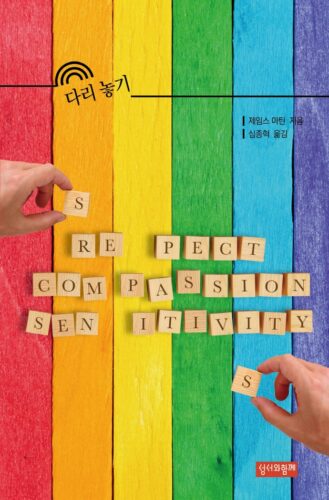A visit to a ministry for formerly gang-involved and incarcerated people earlier this year, part of a gathering of LGBTQ students at Jesuits colleges and universities, helped me understand even more deeply the need for all individuals to feel seen and to know that they are loved by God.
In April, I was privileged to attend this year’s IgnatianQ conference, held this year at Loyola Marymount University, with four students and a colleague from the College of the Holy Cross, where I serve as a chaplain. We listened to powerful reflections about the love of God, the lived experiences of LGBTQ people and our call to work for justice, especially in the church. We prayed together. We laughed and we built community. We celebrated what Greg Boyle, S.J., referred to as “spaciousness of a God who loves without regret or measure,” which I have come to know intimately as a college chaplain.
We had a tangible experience with our God who loves without measure when we visited Father Boyle’s Homeboy Industries in Los Angeles. Through his ministry with formerly gang-involved and incarcerated people, Father Boyle invited us to inch our way towards the margins and to work to dismantle the barriers that exclude. He helped us to encounter God, who calls us to stand with those whose dignity has been denied.
Through walking with and listening to LGBTQ students, I have come to know a God of radical love and inclusivity.
While the connection might not be obvious at first, Father Boyle’s ministry resonated deeply with my own outreach to LGBTQ students during my nearly two decades in campus ministry.
I have had the immense privilege of encountering God through accompanying college students who are grappling with the intersectionality of questions of LGBTQ identity and faith. Though my ministry looks different from Father Boyle’s, through walking with and listening to LGBTQ students, I have come to know a God of radical love and inclusivity, who calls us to stand with, learn from and listen to those on the margins. The IgnatianQ conference served as an extension of my ministry at Holy Cross, where I was able to connect with other students, faculty and staff from Catholic Jesuit Institutions who are working towards a more inclusive church for all.
I have listened to stories of heartache, pain, marginalization and exclusion as LGBTQ students struggle within their families and faith communities to be heard, accepted and loved.
For the past two years, my colleagues and I at Holy Cross have offered a 24-hour retreat, Faithfully Queer, for students who identify as part of the LGBTQ community. During this time of prayer and reflection, participants have the opportunity to build community, to pray and reflect together and to consider who they are and what they believe. It is an opportunity for participants to slow down, reflect, pray, connect and breathe.
“Folks that can be seen are suddenly open to being cherished.”
I remember a student from one retreat. I suggested to them that they pray with Psalm 139: “For you created my inward parts; you knit me together in my mother’s womb. I praise you, for I am fearfully and wonderfully made. Your works are wonderful; this I know full well.”
After a period of journaling and reflection, the student came to me and shared that for the first time, they finally feel and believe that God loves them and created them as they are. The student was able to encounter the living God, who desires a relationship with them as they authentically are, created in the image and likeness of God.
When we celebrate their identity rather than shame it, a student can know in their deepest self that they are good and worthy. As Father Boyle said at IgnatianQ, “Folks that can be seen are suddenly open to being cherished.”
How would our world change if all were cherished? How could this impact the emotional, mental and spiritual wellbeing of those in the LGBTQ community if they felt cherished and seen as God created them to be, instead of being shamed and told there is something wrong with them?
When we stand out on the margins, what do we learn?
I have witnessed the remarkable freedom and joy that can accompany the sharing of a student’s identity. The relief in telling me who they are and who they have known themselves to be is palpable. My first response is always a deep sense of gratitude for entrusting their story and their identity with me. When I can hold their story with love and gratitude, the student can feel a sense of being seen and accepted.
IgnatianQ was a powerful experience of community, prayer, courage, acceptance and joy—it was an experience of God. We were able to pause and see God in all things, especially in the creation of our diverse community. I returned to my ministry at Holy Cross re-energized and hopeful about our work for justice and with a strong sense of community. IgnatianQ was a call for all of us to challenge ourselves to follow the call of Christ, to stand on the margins and to know that the Divine was not confused when we came into this world.
After listening and learning, we need to act for justice and for mercy, in our communities of higher education and our communities of faith. When we stand out on the margins, what do we learn?




